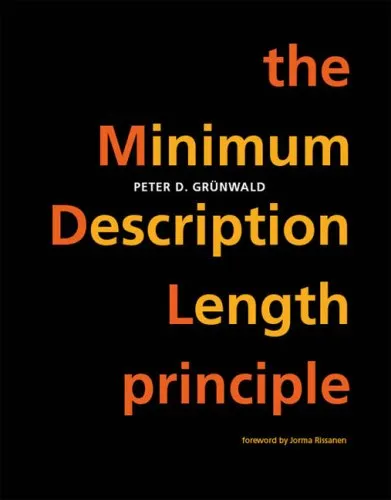The Minimum Description Length Principle (Adaptive Computation and Machine Learning)
4.6
Reviews from our users

You Can Ask your questions from this book's AI after Login
Each download or ask from book AI costs 2 points. To earn more free points, please visit the Points Guide Page and complete some valuable actions.The Minimum Description Length Principle: An Introduction
The Minimum Description Length (MDL) Principle is a compelling and mathematically rigorous approach to understanding and solving problems in data modeling, model selection, and statistical inference. Written by Peter D. Grünwald, The Minimum Description Length Principle delves deep into the theory, applications, and implications of this cornerstone concept in machine learning and computational reasoning.
The book is part of the Adaptive Computation and Machine Learning series and provides a comprehensive, self-contained introduction to MDL. It is ideally suited for researchers, students, and professionals who aim to understand this principle's use in a wide array of disciplines, including statistics, information theory, and artificial intelligence. Through accessible explanations and thorough mathematical rigor, the text outlines how MDL can lead to better, more adaptable models for real-world problems.
Detailed Summary of the Book
At its core, the MDL Principle is rooted in an idea from information theory: the best explanation for a dataset is the one that allows for the shortest possible representation of both the data and the model itself. It elegantly balances the tradeoff between model complexity and data fit, making it a powerful tool for model selection.
The book is divided into several sections, beginning with foundational concepts of algorithmic information theory and Kolmogorov complexity. Grünwald explains these abstract ideas in a lucid and comprehensible way, bridging the gap between theoretical concepts and practical applications. He extends these principles to formalize MDL as a criterion for comparing different models of data. From curve fitting and hypothesis testing to clustering algorithms and regression, MDL finds practical use cases across many domains.
Later chapters expand on the MDL Principle's flexibility, emphasizing its suitability for both parametric and non-parametric models. The book thoroughly discusses coding techniques, two-part codes, and one-part (universal) codes, providing the reader with a detailed understanding of how compression and learning are interconnected. Through worked examples and illustrations, Grünwald also highlights how MDL can outperform traditional methods like Bayesian inference in certain scenarios while remaining more robust against overfitting.
Additionally, the text examines limitations and challenges, such as approximations in MDL implementation and computational considerations. Grünwald offers practical strategies for addressing these challenges, ensuring that readers leave with a nuanced understanding of how to apply MDL in real-world scenarios.
Key Takeaways
- The MDL Principle is a unifying framework that balances model simplicity and accuracy, minimizing overfitting while encouraging interpretability.
- MDL differs from Bayesian methods by its reliance on universal coding rather than prior belief distributions, making it less subjective in many cases.
- The book covers a variety of practical applications, including classification, clustering, and time-series analysis, offering broad utility across machine learning tasks.
- Clear mathematical derivations and examples make even complex concepts accessible to a wide audience of readers.
- MDL emphasizes that models are tools for understanding data, not simply generating predictions, encouraging a thoughtful approach to model-building.
Famous Quotes from the Book
"The essence of the MDL principle lies in its simplicity: to compress is to learn, and the best model is the one that explains the data with the least cost."
"A good model achieves a delicate equilibrium: it must capture the essential structure of the data while remaining sufficiently simple to avoid overfitting."
"The MDL principle connects seemingly unrelated fields—computational learning and information theory—into a common, coherent framework."
Why This Book Matters
In the modern age of data-driven inquiry, choosing the right model for analysis or prediction has become more important than ever. The Minimum Description Length Principle provides a robust framework for addressing this challenge, combining mathematical elegance with practical utility. Its methodology transcends borders between disciplines, offering insights that are invaluable to data scientists, statisticians, and machine learning engineers alike.
The book introduces readers to a paradigm where simplicity and precision work in concert, providing clarity in a rapidly evolving field. Grünwald’s work not only introduces MDL but also establishes its importance for future research and applications. As machine learning increasingly influences critical areas like healthcare, finance, and climate science, the principles in this book become essential tools for responsible and effective decision-making.
By formalizing a clear framework for balancing accuracy and complexity, Grünwald empowers readers to approach their data modeling problems with confidence. This book is more than a detailed exposition of the MDL Principle—it’s an invitation to rethink how we understand, compress, and learn from data.
Free Direct Download
Get Free Access to Download this and other Thousands of Books (Join Now)
For read this book you need PDF Reader Software like Foxit Reader


